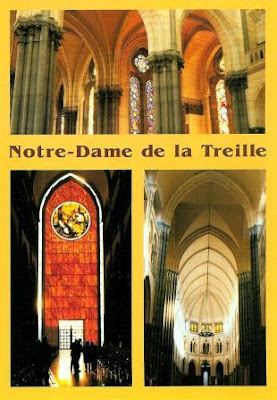In May I decided to send 5 instead of the 4 cards I sent the previous months. If I sent 5 cards, I got 5 cards too. In May the cards arrived from Ukraine, Russia, and USA.
On this card from Alupka, a resort city in Crimea, is possible to see a garden inside the Vorontsov Palace and the Ai-Petri Mountain in the background. Ai-Petri is 1234 meters high. Since 1987, a three kilometer Gondola lift, one of the longest in Europe and split into two stages, carries passengers to and from the mountain, providing visitors with excellent views of the surrounding area and the Black Sea. - in: wikipedia
The card was sent by Alyona.
Tatiana sent this beautiful card from Suzdal, one of the oldest russian towns and the smallest of the Russian Golden Ring towns, with population of just 9978 but a major tourist attraction. The Kremlin with the Cathedral of the Nativity can be seen in the card.
The Suzdal Kremlin is the oldest part of the Russian city of Suzdal, dating from the 10th century. Like other Russian Kremlins, it was originally a fortress or citadel and was the religious and administrative center of the city. It is most notably the site of the Cathedral of the Nativity.
Together with several structures in the neighboring city of Vladimir, it was named a UNESCO World Heritage Site in 1992. - in: wikipedia
Photo © Kevin Shields
In April Nan sent me a beautiful card from Yosemite N. P. and in May sent a card from another national park, Acadia N. P.
The cliffside Bass Harbor Head Lighthouse in Acadia National Park, located in the village of Bass Harbor within Tremont, Maine in the United States, marks the entrance to Bass Harbor on the southwestern side of Mount Desert Island. The lighthouse was built of brick in 1858 on a stone foundation, stands 56 feet above mean high water. - in: http://www.acadiamagic.com/BassHarborLight.html
James Blank Collection
From Maine to Calfornia with this card sent by Brenda.
Big Sur is a lightly populated region of the Central Coast of California where the Santa Lucia Mountains rise abruptly from the Pacific Ocean. Although it has no specific boundaries, many definitions of the area include the 90 miles (140 km) of coastline from the Carmel River in Monterey County south to the San Carpoforo Creek in San Luis Obispo County, and extend about 20 miles (30 km) inland to the eastern foothills of the Santa Lucias.
The name "Big Sur" is derived from the original Spanish-language "el sur grande", meaning "the big south", or from "el país grande del sur", "the big country of the south". This name refers to its location south of the city of Monterey. The terrain offers stunning views, making Big Sur a popular tourist destination. - in: wikipedia
Photo © Craig Turtle
May's journey ends in Oregon. This great card was sent by Cynthia.
Mount Hood, located about 50 miles (80 km) east-southeast of Portland, is a potentially active stratovolcano in the Cascade Volcanic Arc of northern Oregon. The peak is home to 12 named glaciers and snowfields. It is the highest point in Oregon and the fourth highest in the Cascade Range.
Mount Hood is considered the Oregon volcano most likely to erupt, though based on its history, an explosive eruption is unlikely. Still, the odds of an eruption in the next 30 years are estimated at between 3 and 7 percent, so the U.S. Geological Survey (USGS) characterizes it as "potentially active", but the mountain is informally considered dormant. - in: wikipedia


















































